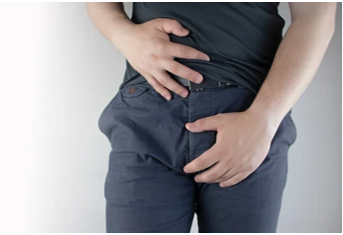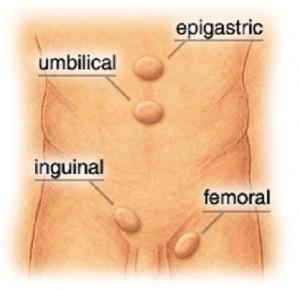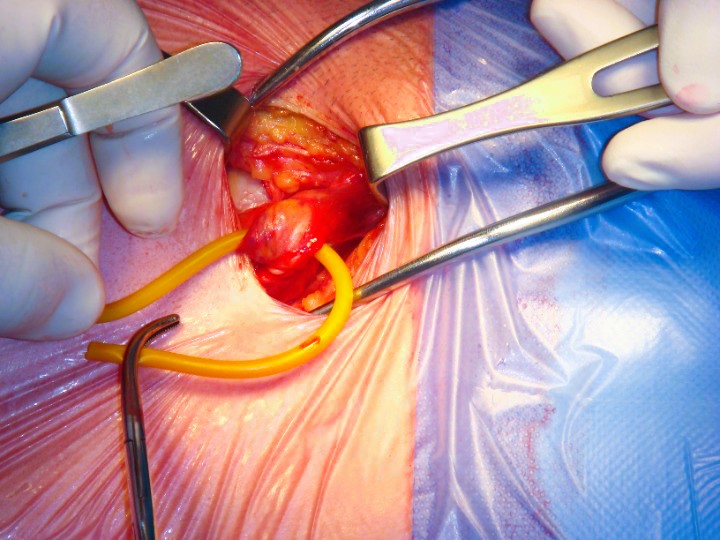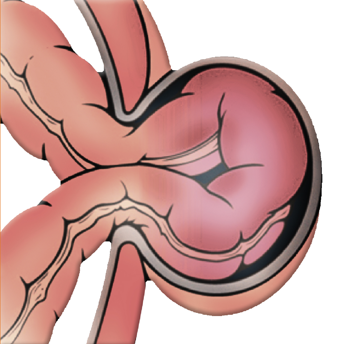Hernia
हर्निया : Hernia / हरनिया : Haraniya / સારણગાંઠ : Saranagantha
-
Symptoms
- Causes
-
Disease
-
Treatment
-
Implications
- Surgery Cost
Typical areas of the body where hernias manifest are:
- Abdomen
- Groin
- Umbilicus
- Any incision or previous abdominal surgery
- Internal – diaphragmatic hiatus
- A bulge or lump in the affected area, which may be more noticeable when standing, lifting heavy weights, coughing, or straining
- Pain & discomfort in the affected area, especially during physical activity or lifting weights or coughing
- Weakness or pressure in the groin or abdominal area
- Fever, Nausea & vomiting can be seen in severe cases
- Regurgitation of food can be indicative of diaphragmatic hiatus hernia
Thus, it is important that any such bulge is immediately noticed by the patient and an appointment is fixed with a surgeon to evaluate the same.




Typical areas of the body where hernias manifest are:
- Abdomen
- Groin
- Umbilicus
- Any incision or previous abdominal surgery
- Internal – diaphragmatic hiatus
- A bulge or lump in the affected area, which may be more noticeable when standing, lifting heavy weights, coughing, or straining
- Pain & discomfort in the affected area, especially during physical activity or lifting weights or coughing
- Weakness or pressure in the groin or abdominal area
- Fever, Nausea & vomiting can be seen in severe cases
- Regurgitation of food can be indicative of diaphragmatic hiatus hernia
Thus, it is important that any such bulge is immediately noticed by the patient and an appointment is fixed with a surgeon to evaluate the same.








Typical areas of the body where hernias manifest are:
- Abdomen
- Groin
- Umbilicus
- Any incision or previous abdominal surgery
- Internal – diaphragmatic hiatus
- A bulge or lump in the affected area, which may be more noticeable when standing, lifting heavy weights, coughing, or straining
- Pain & discomfort in the affected area, especially during physical activity or lifting weights or coughing
- Weakness or pressure in the groin or abdominal area
- Fever, Nausea & vomiting can be seen in severe cases
- Regurgitation of food can be indicative of diaphragmatic hiatus hernia
Thus, it is important that any such bulge is immediately noticed by the patient and an appointment is fixed with a surgeon to evaluate the same.
Hernias can be caused by a variety of factors,
- Lifting heavy weights
- Chronic coughing or sneezing
- Long-standing constipation
- Long-standing difficulty to pass urine
- Aging, with weak abdominal muscles
- Congenital weakness in the abdominal wall
- Injury
- Strenuous physical activity
- Surgical scars (incisional hernias)
- Obesity
- Pregnancy
Hernias can be caused by a variety of factors,
- Lifting heavy weights
- Chronic coughing or sneezing
- Long-standing constipation
- Long-standing difficulty to pass urine
- Aging, with weak abdominal muscles
- Congenital weakness in the abdominal wall
- Injury
- Strenuous physical activity
- Surgical scars (incisional hernias)
- Obesity
- Pregnancy
Hernias can be caused by a variety of factors,
- Lifting heavy weights
- Chronic coughing or sneezing
- Long-standing constipation
- Long-standing difficulty to pass urine
- Aging, with weak abdominal muscles
- Congenital weakness in the abdominal wall
- Injury
- Strenuous physical activity
- Surgical scars (incisional hernias)
- Obesity
- Pregnancy
A hernia occurs when an organ, tissue or fatty tissue protrudes through a weak spot or opening in the muscle or connective tissue that surrounds it.
Hernias can occur in various parts of the body, such as the groin, abdomen, or upper thigh accordingly they are labeled as different types of hernias like,
- Inguinal hernia
- Femoral hernia
- Umbilical hernia
- Epigastric hernia
- Incisional hernia
- Hiatal hernia
Surgery is typically the recommended treatment for a hernia, and may involve open surgery or laparoscopic surgery. In some mild cases, a wait-and-watch approach may be followed, especially if the hernia is small and not causing symptoms.
Hernias don’t heal on their own. They tend to grow larger and in rare cases, lead to complications which can be severe.

A hernia occurs when an organ, tissue or fatty tissue protrudes through a weak spot or opening in the muscle or connective tissue that surrounds it.
Hernias can occur in various parts of the body, such as the groin, abdomen, or upper thigh accordingly they are labeled as different types of hernias like,
- Inguinal hernia
- Femoral hernia
- Umbilical hernia
- Epigastric hernia
- Incisional hernia
- Hiatal hernia
Surgery is typically the recommended treatment for a hernia, and may involve open surgery or laparoscopic surgery. In some mild cases, a wait-and-watch approach may be followed, especially if the hernia is small and not causing symptoms.
Hernias don’t heal on their own. They tend to grow larger and in rare cases, lead to complications which can be severe.


A hernia occurs when an organ, tissue or fatty tissue protrudes through a weak spot or opening in the muscle or connective tissue that surrounds it.
Hernias can occur in various parts of the body, such as the groin, abdomen, or upper thigh accordingly they are labeled as different types of hernias like,
- Inguinal hernia
- Femoral hernia
- Umbilical hernia
- Epigastric hernia
- Incisional hernia
- Hiatal hernia
Surgery is typically the recommended treatment for a hernia, and may involve open surgery or laparoscopic surgery. In some mild cases, a wait-and-watch approach may be followed, especially if the hernia is small and not causing symptoms.
Hernias don’t heal on their own. They tend to grow larger and in rare cases, lead to complications which can be severe.
The treatment for a hernia depends on the type and severity of the hernia, as well as the patient’s overall general status.
Hernias don’t heal on their own. They tend to grow larger and, in some cases, lead to complications which can be severe.
Surgery is recommended in all cases where the bulge is growing larger, causing pain & discomfort, and bulge does not go back on its own.
We prefer to treat hernias with open method which is well proven, time tested and gold standard method. Laparoscopy surgery for hernia, though a newer modality of treatment can have disastrous complications.
Emergency surgery is recommended in cases where the bowel or intestine is stuck to the surrounding tissues and is obstructed/blocked.

The treatment for a hernia depends on the type and severity of the hernia, as well as the patient’s overall general status.
Hernias don’t heal on their own. They tend to grow larger and, in some cases, lead to complications which can be severe.
Surgery is recommended in all cases where the bulge is growing larger, causing pain & discomfort, and bulge does not go back on its own.
We prefer to treat hernias with open method which is well proven, time tested and gold standard method. Laparoscopy surgery for hernia, though a newer modality of treatment can have disastrous complications.
Emergency surgery is recommended in cases where the bowel or intestine is stuck to the surrounding tissues and is obstructed/blocked.


The treatment for a hernia depends on the type and severity of the hernia, as well as the patient’s overall general status.
Hernias don’t heal on their own. They tend to grow larger and, in some cases, lead to complications which can be severe.
Surgery is recommended in all cases where the bulge is growing larger, causing pain & discomfort, and bulge does not go back on its own.
We prefer to treat hernias with open method which is well proven, time tested and gold standard method. Laparoscopy surgery for hernia, though a newer modality of treatment can have disastrous complications.
Emergency surgery is recommended in cases where the bowel or intestine is stuck to the surrounding tissues and is obstructed/blocked.
- Untreated hernias can cause pain and discomfort and may increase in size over time
- They may form adhesions with surrounding tissue, and hence may not be able to retract back completely, despite manual interventions, or lying down
- Complications of a hernia can include obstruction or strangulation of the hernia, which may be life-threatening and requires emergency surgery

Strangulation
- Untreated hernias can cause pain and discomfort and may increase in size over time
- They may form adhesions with surrounding tissue, and hence may not be able to retract back completely, despite manual interventions, or lying down
- Complications of a hernia can include obstruction or strangulation of the hernia, which may be life-threatening and requires emergency surgery

Strangulation

Strangulation
- Untreated hernias can cause pain and discomfort and may increase in size over time
- They may form adhesions with surrounding tissue, and hence may not be able to retract back completely, despite manual interventions, or lying down
- Complications of a hernia can include obstruction or strangulation of the hernia, which may be life-threatening and requires emergency surgery
Hernia Surgery Cost in Mumbai at DLPC
At DLPC, We always strive to ensure that the patients can afford the cost of the surgery. The cost depends on the complexity of the surgery and the hospital chosen. We accept all health insurance & Mediclaim, and also assist our patients with the re imbursement process. Contact us to know more. We are here to help.
Hernia Surgery Cost in Mumbai at DLPC
At DLPC, We always strive to ensure that the patients can afford the cost of the surgery. The cost depends on the complexity of the surgery and the hospital chosen. We accept all health insurance & Mediclaim, and also assist our patients with the re imbursement process. Contact us to know more. We are here to help.
-
Symptoms
- Causes
-
Disease
-
Treatment
-
Implications
- Surgery Cost
Typical areas of the body where hernias manifest are:
- Abdomen
- Groin
- Umbilicus
- Any incision or previous abdominal surgery
- Internal – diaphragmatic hiatus
- A bulge or lump in the affected area, which may be more noticeable when standing, lifting heavy weights, coughing, or straining
- Pain & discomfort in the affected area, especially during physical activity or lifting weights or coughing
- Weakness or pressure in the groin or abdominal area
- Fever, Nausea & vomiting can be seen in severe cases
- Regurgitation of food can be indicative of diaphragmatic hiatus hernia
Thus, it is important that any such bulge is immediately noticed by the patient and an appointment is fixed with a surgeon to evaluate the same.




Typical areas of the body where hernias manifest are:
- Abdomen
- Groin
- Umbilicus
- Any incision or previous abdominal surgery
- Internal – diaphragmatic hiatus
- A bulge or lump in the affected area, which may be more noticeable when standing, lifting heavy weights, coughing, or straining
- Pain & discomfort in the affected area, especially during physical activity or lifting weights or coughing
- Weakness or pressure in the groin or abdominal area
- Fever, Nausea & vomiting can be seen in severe cases
- Regurgitation of food can be indicative of diaphragmatic hiatus hernia
Thus, it is important that any such bulge is immediately noticed by the patient and an appointment is fixed with a surgeon to evaluate the same.








Typical areas of the body where hernias manifest are:
- Abdomen
- Groin
- Umbilicus
- Any incision or previous abdominal surgery
- Internal – diaphragmatic hiatus
- A bulge or lump in the affected area, which may be more noticeable when standing, lifting heavy weights, coughing, or straining
- Pain & discomfort in the affected area, especially during physical activity or lifting weights or coughing
- Weakness or pressure in the groin or abdominal area
- Fever, Nausea & vomiting can be seen in severe cases
- Regurgitation of food can be indicative of diaphragmatic hiatus hernia
Thus, it is important that any such bulge is immediately noticed by the patient and an appointment is fixed with a surgeon to evaluate the same.
Hernias can be caused by a variety of factors,
- Lifting heavy weights
- Chronic coughing or sneezing
- Long-standing constipation
- Long-standing difficulty to pass urine
- Aging, with weak abdominal muscles
- Congenital weakness in the abdominal wall
- Injury
- Strenuous physical activity
- Surgical scars (incisional hernias)
- Obesity
- Pregnancy
Hernias can be caused by a variety of factors,
- Lifting heavy weights
- Chronic coughing or sneezing
- Long-standing constipation
- Long-standing difficulty to pass urine
- Aging, with weak abdominal muscles
- Congenital weakness in the abdominal wall
- Injury
- Strenuous physical activity
- Surgical scars (incisional hernias)
- Obesity
- Pregnancy
Hernias can be caused by a variety of factors,
- Lifting heavy weights
- Chronic coughing or sneezing
- Long-standing constipation
- Long-standing difficulty to pass urine
- Aging, with weak abdominal muscles
- Congenital weakness in the abdominal wall
- Injury
- Strenuous physical activity
- Surgical scars (incisional hernias)
- Obesity
- Pregnancy
A hernia occurs when an organ, tissue or fatty tissue protrudes through a weak spot or opening in the muscle or connective tissue that surrounds it.
Hernias can occur in various parts of the body, such as the groin, abdomen, or upper thigh accordingly they are labeled as different types of hernias like,
- Inguinal hernia
- Femoral hernia
- Umbilical hernia
- Epigastric hernia
- Incisional hernia
- Hiatal hernia
Surgery is typically the recommended treatment for a hernia, and may involve open surgery or laparoscopic surgery. In some mild cases, a wait-and-watch approach may be followed, especially if the hernia is small and not causing symptoms.
Hernias don’t heal on their own. They tend to grow larger and in rare cases, lead to complications which can be severe.

A hernia occurs when an organ, tissue or fatty tissue protrudes through a weak spot or opening in the muscle or connective tissue that surrounds it.
Hernias can occur in various parts of the body, such as the groin, abdomen, or upper thigh accordingly they are labeled as different types of hernias like,
- Inguinal hernia
- Femoral hernia
- Umbilical hernia
- Epigastric hernia
- Incisional hernia
- Hiatal hernia
Surgery is typically the recommended treatment for a hernia, and may involve open surgery or laparoscopic surgery. In some mild cases, a wait-and-watch approach may be followed, especially if the hernia is small and not causing symptoms.
Hernias don’t heal on their own. They tend to grow larger and in rare cases, lead to complications which can be severe.


A hernia occurs when an organ, tissue or fatty tissue protrudes through a weak spot or opening in the muscle or connective tissue that surrounds it.
Hernias can occur in various parts of the body, such as the groin, abdomen, or upper thigh accordingly they are labeled as different types of hernias like,
- Inguinal hernia
- Femoral hernia
- Umbilical hernia
- Epigastric hernia
- Incisional hernia
- Hiatal hernia
Surgery is typically the recommended treatment for a hernia, and may involve open surgery or laparoscopic surgery. In some mild cases, a wait-and-watch approach may be followed, especially if the hernia is small and not causing symptoms.
Hernias don’t heal on their own. They tend to grow larger and in rare cases, lead to complications which can be severe.
The treatment for a hernia depends on the type and severity of the hernia, as well as the patient’s overall general status.
Hernias don’t heal on their own. They tend to grow larger and, in some cases, lead to complications which can be severe.
Surgery is recommended in all cases where the bulge is growing larger, causing pain & discomfort, and bulge does not go back on its own.
We prefer to treat hernias with open method which is well proven, time tested and gold standard method. Laparoscopy surgery for hernia, though a newer modality of treatment can have disastrous complications.
Emergency surgery is recommended in cases where the bowel or intestine is stuck to the surrounding tissues and is obstructed/blocked.

The treatment for a hernia depends on the type and severity of the hernia, as well as the patient’s overall general status.
Hernias don’t heal on their own. They tend to grow larger and, in some cases, lead to complications which can be severe.
Surgery is recommended in all cases where the bulge is growing larger, causing pain & discomfort, and bulge does not go back on its own.
We prefer to treat hernias with open method which is well proven, time tested and gold standard method. Laparoscopy surgery for hernia, though a newer modality of treatment can have disastrous complications.
Emergency surgery is recommended in cases where the bowel or intestine is stuck to the surrounding tissues and is obstructed/blocked.


The treatment for a hernia depends on the type and severity of the hernia, as well as the patient’s overall general status.
Hernias don’t heal on their own. They tend to grow larger and, in some cases, lead to complications which can be severe.
Surgery is recommended in all cases where the bulge is growing larger, causing pain & discomfort, and bulge does not go back on its own.
We prefer to treat hernias with open method which is well proven, time tested and gold standard method. Laparoscopy surgery for hernia, though a newer modality of treatment can have disastrous complications.
Emergency surgery is recommended in cases where the bowel or intestine is stuck to the surrounding tissues and is obstructed/blocked.
- Untreated hernias can cause pain and discomfort and may increase in size over time
- They may form adhesions with surrounding tissue, and hence may not be able to retract back completely, despite manual interventions, or lying down
- Complications of a hernia can include obstruction or strangulation of the hernia, which may be life-threatening and requires emergency surgery

Strangulation
- Untreated hernias can cause pain and discomfort and may increase in size over time
- They may form adhesions with surrounding tissue, and hence may not be able to retract back completely, despite manual interventions, or lying down
- Complications of a hernia can include obstruction or strangulation of the hernia, which may be life-threatening and requires emergency surgery

Strangulation

Strangulation
- Untreated hernias can cause pain and discomfort and may increase in size over time
- They may form adhesions with surrounding tissue, and hence may not be able to retract back completely, despite manual interventions, or lying down
- Complications of a hernia can include obstruction or strangulation of the hernia, which may be life-threatening and requires emergency surgery
Hernia Surgery Cost in Mumbai at DLPC
At DLPC, We always strive to ensure that the patients can afford the cost of the surgery. The cost depends on the complexity of the surgery and the hospital chosen. We accept all health insurance & Mediclaim, and also assist our patients with the re imbursement process. Contact us to know more. We are here to help.
Hernia Surgery Cost in Mumbai at DLPC
At DLPC, We always strive to ensure that the patients can afford the cost of the surgery. The cost depends on the complexity of the surgery and the hospital chosen. We accept all health insurance & Mediclaim, and also assist our patients with the re imbursement process. Contact us to know more. We are here to help.
DADAR
APPOINTMENT
+91 76780 44446
501/A, 5th floor, Civic Center,
MMGS Marg, Near Kailash Lassi,
Dadar East,
Mumbai- 400014.
TARDEO
@ APOLLO SPECTRA HOSPITALS
APPOINTMENT
+91 76780 44446
+91 22 4332 4500
156, Famous Cine Labs,
Behind Everest Building,
Tardeo, Mumbai-400034.
CHEMBUR
@ APOLLO SPECTRA HOSPITALS
APPOINTMENT
+91 76780 44446
+91 22 4334 4600
Ujagar Compound Opp.
Deonar Bus Depot Main Gate,
Deonar, Chembur, Mumbai-400088.
PAREL
APPOINTMENT
+91 76780 44446
+91 22 3175 4365
4, Ramesh Bhuvan,JM Street,
Opp. KEM Hosp Gate No2, Parel,
Mumbai - 400012.
Now At
BANDRA
APPOINTMENT
+91 76780 44446
+91 22 2644 8888
C/o Apple Diagnostic Centre,
101-103, 1st Floor, Mangal Simran CHS Ltd., 28th Road,
Bandra (West), Mumbai - 400050.
DADAR
APPOINTMENT
+91 76780 44446
+91 8604 8604 26
501/A, 5th floor, Civic Center,
MMGS Marg, Near Kailash Lassi,
Dastoorwadi, Dadar East,
Mumbai- 400014.
TARDEO
@ APOLLO SPECTRA HOSPITALS
APPOINTMENT
+91 76780 44446
+91 22 4332 4500
156, Famous Cine Labs,
Behind Everest Building,
Tardeo, Mumbai-400034.
CHEMBUR
@ APOLLO SPECTRA HOSPITALS
APPOINTMENT
+91 76780 44446
+91 22 4334 4600
Ujagar Compound Opp.
Deonar Bus Depot Main Gate,
Deonar, Chembur, Mumbai-400088.
Now At
PAREL
APPOINTMENT
+91 76780 44446
+91 22 3175 4365
4, Ramesh Bhuvan,JM Street,
Opp. KEM Hosp Gate No2, Parel,
Mumbai - 400012.
Coming Soon
BANDRA
APPOINTMENT
+91 76780 44446
+91 22 2644 8888
101-103, 1st Floor, Mangal Simran CHS Ltd., Above Talwarkars Gym, 28th Road,
Bandra (West),
Mumbai - 400050.
DADAR
APPOINTMENT
+91 76780 44446
+91 8604 8604 26
501/A, 5th floor, Civic Center, MMGS Marg, Near Kailash Lassi, Dadar East, Mumbai- 400014.
TARDEO
@ APOLLO SPECTRA HOSPITALS
APPOINTMENT
+91 76780 44446
+91 22 4332 4500
156, Famous Cine Labs,
Behind Everest Building,
Tardeo, Mumbai-400034.
CHEMBUR
@ APOLLO SPECTRA HOSPITALS
APPOINTMENT
+91 76780 44446
+91 22 4334 4600
Ujagar Compound Opp.
Deonar Bus Depot Main Gate,
Deonar, Chembur, Mumbai-400088.
PAREL
APPOINTMENT
+91 76780 44446
+91 22 3175 4365
4, Ramesh Bhuvan,JM street,
Opp. KEM Hosp Gate No2, Parel,
Mumbai - 400012.
Now At
BANDRA
APPOINTMENT
+91 76780 44446
C/o Apple Diagnostic Centre, 101-103, 1st Floor, Mangal Simran CHS Ltd., 28th Road, Bandra (West), Mumbai - 400050.
DADAR
APPOINTMENT
+91 76780 44446
+91 8604 8604 26
501/A, 5th floor, Civic Center,
MMGS Marg, Near Kailash Lassi,
Dadar East,
Mumbai- 400014.
TARDEO
@ APOLLO SPECTRA HOSPITALS
APPOINTMENT
+91 76780 44446
+91 22 4332 4500
156, Famous Cine Labs,
Behind Everest Building,
Tardeo, Mumbai-400034.
CHEMBUR
@ APOLLO SPECTRA HOSPITALS
APPOINTMENT
+91 76780 44446
+91 22 4334 4600
Ujagar Compound Opp.
Deonar Bus Depot Main Gate,
Deonar, Chembur, Mumbai-400088.
PAREL
APPOINTMENT
+91 76780 44446
+91 22 3175 4365
4, Ramesh Bhuvan,JM street,
Opp. KEM Hosp Gate No2, Parel,
Mumbai - 400012.
Now At
BANDRA
APPOINTMENT
+91 76780 44446
+91 22 2644 8888
C/o Apple Diagnostic Centre,
101-103, 1st Floor, Mangal Simran CHS
Ltd., 28th Road,
Bandra (West), Mumbai - 400050.
All images and content on this website are property of Dr Laxman Proctology Center
*The purpose of this website is to create awareness and disseminate clinical information to the general public & patients, about proctology, general surgery, and other such health disorders. We do not claim to have a singular or unique cure, though we have tremendous experience & expertise, in surgical and medical management of these cases. This site contains medical images which may be graphical and may appear offensive. Viewer discretion is advised. Please exit if you are affected by the images. Patient privacy is of utmost importance at DLPC. The names of the patients & personal details are never divulged, in order to protect their privacy. The images on our website have no reference to any patient, and cannot be downloaded from our website.
